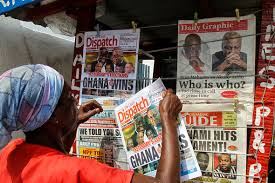The report that the Bank of Ghana (BoG) has maintained its Monetary Policy Rate at 29 percent, citing a slightly elevated inflation profile on account of recent exchange rate pressures and adjustments in transportation fares is one of the leading stories in the Ghanaian press on Tuesday.
The Graphic reports that the Bank of Ghana (BoG) has maintained its Monetary Policy Rate at 29 percent, citing a slightly elevated inflation profile on account of recent exchange rate pressures and adjustments in transportation fares.
However, it said the projections showed that inflation would remain within the monetary policy consultation clause of 13 to 17% at the end of the year.
Dr Ernest Addison, Governor of the Central Bank made the announcements during a press briefing following the Bank’s 118th Monetary Policy Committee meeting in Accra on Monday.
TotalEnergies Marketing PLC says the regulatory framework guiding the implementation of the local content policy in the market focuses on shareholding rather than value creation in the supply and distribution chain.
The phenomenon, it said, does not only discriminate against existing partly foreign-owned companies but has also led to market restrictions contrary to the legitimate expectations of these companies as investors in the country.
It argued that the unintended consequences of this regulatory framework in terms of attraction of foreign direct investment into the country cannot be overemphasised.
Hence, just like other countries in the sub-region that have successfully implemented local content policies in their oil and gas sectors, it is worth considering that an implementation approach which aims at local content development for both Ghanaian and existing non-fully Ghanaian companies operating in the industry will enhance the impact of this laudable initiative on the economy of Ghana.
The board chairman of the company, Philippe Ebanga, in his annual report, said “It is believed that an approach that focuses on the quantum of composite value added to, or created in Ghana through the utilisation of Ghanaian resources and services will better yield the intended objectives of the local content policy in the downstream petroleum sector.
This will accommodate both international and Ghanaian companies operating in the country’s oil and gas industry with its attendant several benefits and advantages for indigenous or local companies in the industry, and the country in general.”
Mr Ebanga, however, acknowledged the fact that in recent times, the downstream petroleum industry has also been characterised by a phased implementation of the local content policy which aims to harness the benefits of the industry for Ghanaians.
“It is commendable and worth highlighting that the industry is now largely dominated by indigenous Ghanaian companies who currently control over 80% of the market,” he said.
The newspaper says that the former President John Dramani Mahama addressed the 8th Ghana CEO Summit in Accra on Monday and said “unemployment has jumped to 14.7 per cent from 8.5 per cent in 2017, the highest level recorded in the history of the 4th Republic.”
He said inflation on its part was above 25 percent, and the current interest rates range between 30and 50 per cent.
The former President said the exchange rate, which was previously at 4.00 Ghana Cedis to the US dollar, has crossed the 15 Ghana Cedi threshold, and there appears to be no end in sight to the deterioration of the cedi.
“Despite this, the government remains unconcerned, unwilling to cut expenditures, and continues to spend more on creature comforts instead of investing in the transformational infrastructure that will propel this nation forward.”
Vice President Bawumia’s counter of Mahama’s position at the CEO Summit. At the 8th Ghana CEO Summit, Vice President Dr. Mahamudu Bawumia joined the debate remotely via the internet and counted former President Mahama’s position as the two engaged in a spirited exchange of ideas and policies.
The debate, a highlight of the summit, brought together two of Ghana’s prominent political figures to discuss critical issues affecting the Ghana’s economy and development.
Dr. Bawumia, known for his economic acumen, presented a case for the current administration’s policies, emphasising the strides made in digital transformation, financial inclusion, and infrastructural development.
The Ghanaian Times reports that the European Union (EU) has delivered more than two million kilogrammes of seeds and fertilisers to support 12,600 smallholder farmers in the Northern Region for this year’s planting season. The gesture was under the EU-funded Food Security Response project and facilitated by the Food and Agriculture Organisation (FAO) of the United Nations in collaboration with the Ministry of Food and Agriculture.
The agriculture inputs delivered included 118,000 kg of maize seeds, 3,000 kg of sorghum foundation seeds, and 540 kg of millet foundation seeds; 31,200 bags of 50 kg NPK fertiliser and 14,000 bags of 50 kg urea fertiliser.
A press statement issued by the FAO in Accra copied by the Ghanaian Times said that the beneficiaries were drawn from Bunkpurugu-Nakpanduri, Central Gonja, North Gonja, Northeast Gonja, Bongo, and Kasena Nankana West Districts.
According to the statement, the FAO Representative in Ghana, Arslen Bounemra, said, “This initiative underscores our unwavering commitment to enhancing food security and empowering local communities.”
“We are proud to collaborate with the Ministry of Agriculture and the European Union to deliver essential agricultural inputs to farmers in Northern Ghana.”
The statement also quoted the EU Ambassador to Ghana, Irchad Razaaly, as saying,“By combining our resources and expertise, the EU and FAO, in partnership with the Government of Ghana, are working together to ensure that farmers have access to high-quality seeds and other vital inputs necessary for successful crop cultivation for the 2024 planting season.
“This initiative is part of our broader mission to empower smallholder farmers, improve food security, and promote sustainable agricultural practices,” he said.
GIK/APA
Ghana: Press focuses on retaining of policy rate by BoG at 29%

Next Article Ghana retains interest rate at 29%

